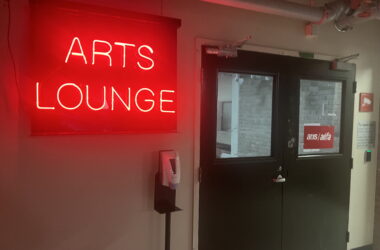In January 2025, McGill Interim Deputy Provost (Student Life & Learning) Angela Campbell issued a notice of default of McGill’s Memorandum of Agreement (MoA) with the Quebec Public Interest Research Group (QPIRG) at McGill. The university warned QPIRG that it will suspend the student funding that QPIRG receives if the organization continues to support Students for Palestine’s Honour and Resistance (SPHR).
SPHR is one of QPIRG’s 17 working groups, which are collectives of students and community members selected annually by QPIRG to receive financial and administrative support from the organization.
In an interview with The Tribune, Nelly Wat, an outreach coordinator at QPIRG, explained that McGill issued QPIRG a notice of default because McGill views SPHR to have breached the university’s Code of Student Conduct.
“[McGill is] saying that by [QPIRG] supporting SPHR […] by providing funding and resources, we are effectively also in breach of the Code of Conduct, and therefore in breach of our Memorandum of Agreement with McGill,” Wat said.
Wat then described QPIRG’s attempts to negotiate with Campbell and McGill’s Dean of Students, Tony Mittermaier, after McGill issued the notice of default. They reported that two student representatives of QPIRG met with McGill twice in a non-legal setting. According to Wat, both meetings ended in a stalemate.
“[McGill was] saying that […] [we] have to cease providing any funding to SPHR, [that we] have to notify them in writing and provide a read receipt that they have, in fact, received this, that [we are] no longer supporting them,” Wat said. “And until [we] do this, [QPIRG] cannot book events on campus. That was a consequence that [McGill] invented to impose on us, to give us a bit of a sense of urgency, or to pressure us.”
Carl Bystram, a community research and working groups coordinator at QPIRG, explained to The Tribune that the next step QPIRG is taking is to contest the notice of default through arbitration.
“McGill can’t say we’re in breach of contracts, and they can’t declare that unilaterally,” Bystram said. “This actually has to be […] found by an arbitrator or judge. On top of that, there has been a fight to just get McGill to stand by, to obey the [MoA]. So now it is also a procedural issue.”
Bystram also shared that the legal costs of arbitration will be a challenge to QPIRG.
“Arbitration costs $950 [CAD] an hour,” Bystram said. “Bringing small, grassroots social justice groups into court is a way of paralyzing them financially. So regardless of the outcome of the actual arbitration, even if it goes into our favor, we will have lost an enormous amount of resources for this.”
As a result, QPIRG has launched a legal fundraiser, aiming to raise $15,450 CAD to support their legal efforts. As of Sept. 3, they have raised $10,559 CAD, with major donors including Queer McGill and The Association of Graduate Students Employed at McGill.
In a written statement to The Tribune, McGill’s Media Relations Office (MRO) reiterated that SPHR is unaffiliated with McGill and that the university supports rightful protest on campus, despite its decision to issue QPIRG a notice of default.
“The QPIRG MoA was terminated because of its [expression of] support, including financial support, for SPHR,” the MRO wrote. “[….] To be clear, McGill is firmly committed to freedom of expression and has no issue with lawful activism and protest regardless of the cause.”
In an interview with The Tribune, former Students’ Society of McGill University (SSMU) Vice President External Affairs Hugo-Victor Solomon pointed out similarities between QPIRG’s and SSMU’s respective conflicts with McGill.
“This fight that QPIRG is going through is identical to the fight that SSMU went through,” Solomon said. “In the default letter that [Campbell] sent to QPIRG, she actually […] just sent a copy of what she had sent [SSMU] [….] It’s unsettling to say the least.”
Bystram also noted a pattern of McGill exercising legal tactics against student groups.
“Court cases aren’t things that necessarily a lot of universities do, like the kind of constant threat over [MoAs], it’s actually quite McGill-specific,” Bystram said. “This is a part of a financial weight that they add on student resources. It is also an extremely expensive procedure on their end, and they keep on doing this while they claim to be broke.”
Bystram further outlined how QPIRG will proceed if they are to be found in default during arbitration. They mentioned how McGill is exploiting its policies to target student activist groups.
“There [would be] a procedure where we [would have to] restructure the organization until it is in compliance with the contract,” Bystram explained. “We have interpreted this as meaning that we would have to drop SPHR [as a working group] [….] [McGill’s] Code of Conduct is not meant to be used against a group. They’re really changing the rules so that they can have exceptions where they’re able to repress political action on campus.”
Solomon highlighted QPIRG’s dedication to social and environmental justice, and its important place in life at McGill.
“Oppressing student mobilization on baseless claims should never be tacitly accepted or normalized,” Solomon said. “[QPIRG has] become an invaluable part of the fabric of this community. It’s not the first time that McGill has tried to go after them [….] The fact that they’ve been around for decades is a testament to how invaluable their presence is.”








